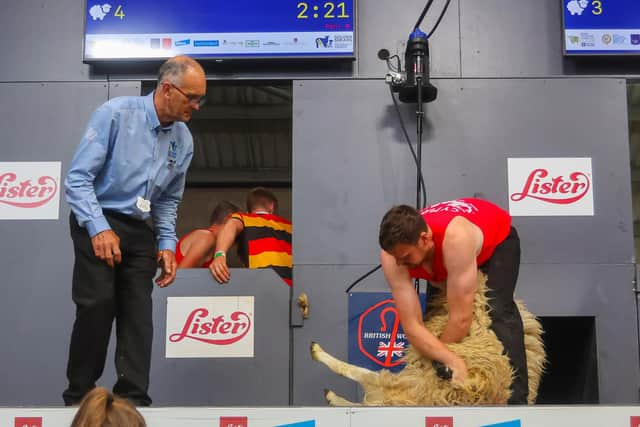Royal Highland Show: That's a wrap for 2023 with ticket sales already going on sale for next year
Some 200,000 people, 5,000 animals and 280 trophies later, the Royal Highland Show has closed its gates for another year.
Tickets for the sell out event have already gone on sale for 2024.
Advertisement
Hide AdAdvertisement
Hide AdFrom ferrets to farriers, goats to gins, the four day show saw businesses, campaigners, politicians working in and with Scotland’s rural life descend on the Ingliston-based showground over the weekend.


Its spotlight event was the return of the Golden Shears World Shearing and Woolhandling Championships which saw fierce competition between some 30 countries compete for the world title.
The international competition was broadcast on RHS TV which drew in viewers from around the globe, totalling 140,000 views across 113 countries over the course of the event.
Animal activist group Animal Rising protesters stormed the stage temporarily on the Saturday, but the competition continued to see the top individual titles go to Gwion Lloyd Evans from Wales for Machine, Bonile Rabela from South Africa for Blade, and Rosie Keenan from Scotland for Wool Handling.
In the team's section, South Africa triumphed in Blade, Wales took the title for Machine, and Wales again for Wool Handling.
While most eyes were on the shearing competition and show livestock in the site’s main ring each day, many mouths were on the Scotland’s Larder section.
The venue hosted a diverse market of food stands from crisps made with seaweed harvested off the west coast to punnets of red ripe strawberries grown in Angus, and saw the Scottish bread, honey, cheese, butter and ice cream championships take place.
One visitor enjoying the foodie spread was First Minister of Scotland Humza Yousaf who unveiled a new industry-led strategy which aims for a 25 per cent increase in turnover for Scotland’s food and drink sector by 2028.
Advertisement
Hide AdAdvertisement
Hide AdMr Yousaf, a little nervous around the cows, also met with stakeholders at the show, including the National Farmers Union Scotland.
On the opening day of the event, farmers sent a strong message claiming the “hardening” Scottish Greens agenda is a threat to agriculture and biodiversity in Scotland.
Despite muddling his farming facts when asked about bracken and Asulox by journalists, the first minister vowed to work directly with farmers as Scotland works towards a more food-secure and sustainable future.
Lorna Slater, co-leader of the Scottish Greens, also made an appearance at the show. The minister has been under fire recently with many rural business groups taking aim at her handling of the Deposit Return Scheme and the Scottish Government’s position on the use of the herbicide Asulox.
Speaking at the Soil Association Scotland stand, Ms Slater said the farming versus environment conversations need to end and that Scotland needs both to work together to flourish.
And rural affairs secretary Mairi Gougeon was spotted hopping from one event to the next throughout the event.
Despite saying she would “put more meat on the bones” of Scotland’s agriculture policy in an announcement at the opening of the show, there was clear disappointment from farmers who said her supposed update on conditions for future subsidy payments lacked much-needed detail.
While the show was a clear success in visitor numbers, and the best of Scotland’s food, drink, forestry, farming and overall country life was well exhibited, the political visits and conversations in different stakeholder tents at the showground showed an underlying deep insecurity among rural communities.
Advertisement
Hide AdAdvertisement
Hide AdWith the likes of the Agriculture Bill, Land Reform Bill and the Wildlife Management and Muirburn Bill, going through Parliament at the moment, the future of many rural businesses featured at the show hangs in the balance.
There’s an important balance to strike between ensuring a food secure but also sustainable and nature friendly future.
With roughly 80 per cent of Scotland’s land being used for some form of agriculture, it’s essential the farmers are involved in every step of the way.
Comments
Want to join the conversation? Please or to comment on this article.